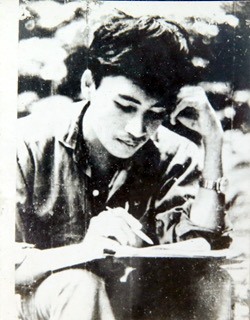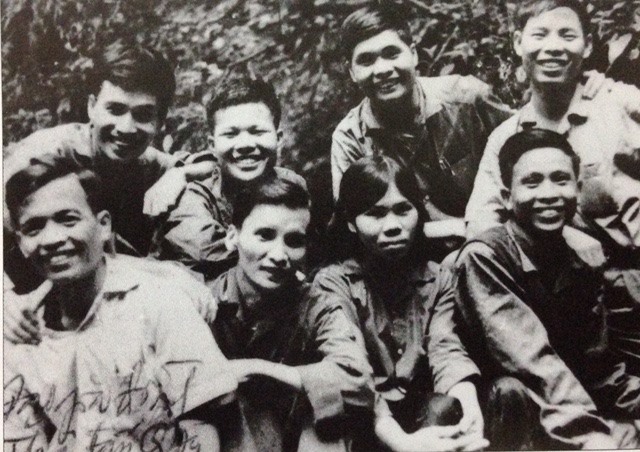Viet Nam News
By Thien Huong
August brings a cooler wind and the gentle yellow sunlight of autumn. The entire country remembers the historic moment of the revolutionary wars to liberate the country from colonialism: the August 1945 Revolution.
On this special occasion, the National Political Truth Publishers has just released a book titled Thoi Toi Song (The Time I Lived) by journalist Tran Mai Hanh.
The book features real stories of patriotism, humanity, sacrifice, comradeship and love that happened during the 10 years of the Anti-American War when he worked as a war correspondent for the Vietnam News Agency.
The stories have details on real people and real events together with photos and documents that the author carefully collected during the period from 1965-75.
 |
| Scribbling: Hanh writes in his diary at the Quang Da battle field in 1968. |
“Over the past 50 years since I joined the Quang Da [Quang Nam and Da Nang] battle fields, I have always remembered a heroic era in my lifetime, the battles I witnessed, and the sacrifices made by liberation fighters,” Hanh told Viet Nam News.
“I felt relieved a little bit and feel as if I had paid a debt to my comrades when I wrote down these stories from my diary and notes,” he said.
Hanh was a literature graduate from Ha Noi University—today’s Ha Noi University of Social Sciences and Humanities.
Right after graduation, he became a war correspondent of the Vietnam News Agency.
He was also among the journalists assigned to join the Ho Chi Minh Campaign to cover the historic moments of on April 30, 1975 at the Independence Palace in the then Sai Gon, now Ho Chi Minh City.
He kept the habit of noting down what happened everyday, which then became the main material for the 300-page book Thoi Toi Song.
The book consists of 12 stories he wrote during the Quang Da battle (1968-69) and four pieces he wrote during the period from 1970-75.
Yet Thoi Toi Song is of a different style. The book does not only contain real historical details on real people and real events but also contains the author’s identity—he uses the word “I” to convey his unique perspective on events he witnessed.
The stories bear full literary features, written with deep feelings, with characters and the “self” of the writer most lively in a fierce bombing time.
According to Hanh, many characters in the stories are real persons with their real names, like Mr Dau in short story titled Mr Dau; late journalist and poet Nguyen Trong Dinh in the story Bai Tho Tinh Dam Mau (Bloodstained Love Poem); composer Phan Mieng in the story Cau Chuyen ve Mot Ban Hop Xuong (Story on a Chorus); Le Hong Tu and Nguyen Thi Chau in Con Dao Mot Ngay Thang Bay (Con Dao on a Day in July) and the soldiers and journalists in Danh Du Nguoi Linh (Honour of Soldiers) and Than Chet, Than Kho Ai ( Death, Misery). The later two pieces were written between two battles that were part of a close siege by the enemy.
 |
| Bearing witness: Journalist Tran Mai Hanh (first from left, second row) with his war correnspondence colleagues at Quang Da battle field. |
In the rest of the stories in the book, the author changed the names of the characters because he feared that revealing their identities would alter their lives.
In front of each story in Thoi Toi Song, there is an introduction of the situation when the story was written. Various photos and documents accompany the stories to confirm their truth. Though they are written as literary short stories or notes, they are non-fiction.
Danh Du Nguoi Linh is the story which Hanh imbued with the most feelings. It features the fiercest moments of the war in November 1968 at the Quang Da battle field.command
“Batallion 3 of the North, which has been awarded the title "Hero of the People’s Armed Forces", fights in the Quang Da battle field under the Front Command No 4,” he recalled. “The batallion has fought 21 non-stop days through a dense siege of 7,000 American and Sai Gon regime soldiers.”
“The Front Command assigned me to the unit fighting within the siege of the army to write stories to encourage the soldiers’ spirits.
“During those 21 historical days, I lived and struggled with the solders for 16 days [as I reached the unit on the sixth day of the fighting].
“A great number officers and men of the heroic battalion died. Only a few soldiers and me were ordered to break the siege to report to senior commanders to ask for reinforcements to the battalion.”
“The battalion commissar ordered me: ‘Comrade journalist, you have to break the siege together with the other soldiers. You then have the possibility to report this fierce fight.”
What makes the book special is that Hanh for the first time publishes some letters he sent to the woman he loved during the war.
“I kept the habit of copying important letters including love letters before I sent them to the woman I loved. I consider them a part of my spirit’s treasure,” Hanh said.
“Before our wedding, my present wife read all diary and letters I kept,” he said, explaining that he did not marry the beloved woman to whom he wrote the letters. “After careful considering, my wife permitted me to keep them all. That’s why I have them to publish now.”
The letters written on the border between life and death, have surpassed normal feelings of love to include thoughts on war, peace, and the desire for living and sacrifice in the war time.
“No one else has read them in the past 50 years,” he said. “Now I publish them not for anyone special, I just want to contribute a love letter of a faraway bombing time.”VNS